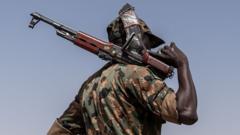The Kordofan region of Sudan has transformed into a critical battleground in the ongoing war between the army and rival paramilitary forces, as both factions vie for dominance over this oil-rich territory. This clash comes amid a conflict that has plagued Sudan for over two years, with attacks in early October claiming hundreds of civilian lives and drawing attention to this volatile area.
Experts, including Amir Amin from Oasis Policy Advisory, emphasize the strategic significance of Kordofan, stating that controlling this region equates to controlling the nation's oil supply and essential land. The situation is also dire for neighboring South Sudan, as the stability of Kordofan is vital for the continued flow of oil exports through its pipelines.
Since June, the army has intensified operations to reclaim territory lost to the Rapid Support Forces (RSF), which gained ground during an intense power struggle between army chief Gen. Abdel Fattah al-Burhan and RSF commander Gen. Mohamed Hamdan Dagalo, aka "Hemedti." The RSF briefly seized Khartoum following the onset of violence in April 2023, but the army's recent regain of the capital has altered the dynamics of power.
Despite having control over oil fields, the army faces resistance from the RSF, as many of its fighters belong to the Misseriya ethnic group, indigenous to the region. This local connection complicates the army's efforts to break RSF defenses, as Dr. Suliman Baldo of the Sudan Transparency and Policy Tracker warns.
Amid escalating airstrikes in West Kordofan, including attacks on populated towns, the situation continues to deteriorate. The United Nations has condemned the army's actions, which reportedly resulted in civilian injuries and fatalities. Humanitarian organizations also report a harrowing increase in violence, alleging that the RSF has targeted civilians amidst the conflict.
With the RSF now actively mobilizing for potential offensives to capture strategic locations such as el-Obeid, the capital of North Kordofan, experts predict that the conflict in Kordofan could stretch for an extended period, featuring continued rivalries and humanitarian crises. As the stakes rise, observers caution that this struggle may indeed lead to profound shifts in the ongoing war, shaping the future of Sudan's power dynamics.


















